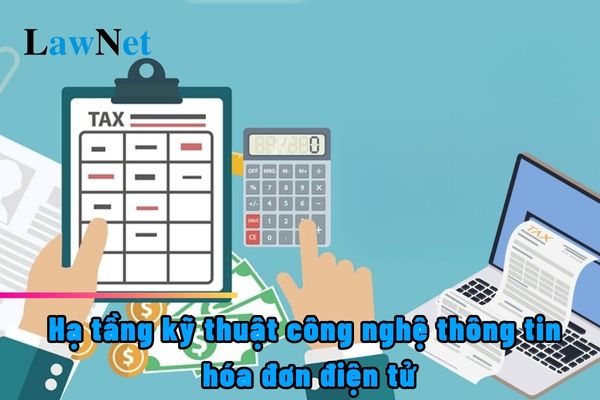Vietnam: What does the information technology infrastructure for e-invoices include?
What is the time limit for providing information on e-invoices with large data in Vietnam?
Based on Article 51 of Decree 123/2020/ND-CP, within no more than 5 minutes from receiving the request, the e-portal responds to the information user:
- Information on e-invoices:
It provides a notification of the reason in case the system encounters a problem or there is no information on e-invoices.
- In case of requests for providing information with large data, the time limit for providing e-invoice information is announced by the General Department of Taxation.
Thus, in cases requiring the provision of e-invoice information with large data, the time limit is announced by the General Department of Taxation.

Vietnam: What does the information technology infrastructure for e-invoices include? (Image from the Internet)
Vietnam: What does the information technology infrastructure for e-invoices include?
According to Article 42 of Decree 123/2020/ND-CP, the regulations are as follows:
- Information technology infrastructure for e-invoices and e-documents includes a collection of computing devices (servers, workstations), network transmission systems, network connection devices, security devices (or software), secure databases, storage devices, peripheral devices, auxiliary equipment, and internal networks.
- The software system to manage, operate, and exploit the information system for e-invoices and e-documents includes: operating system, database management system, and application software.
Thus, according to the above regulation, the information technology infrastructure for e-invoices includes:
[1] A collection of computing devices (servers, workstations),
[2] Network transmission systems, network connection devices,
[3] Security devices (or software), secure databases, storage devices, peripheral devices, auxiliary equipment, and internal networks.
Can information on e-invoices be used to deduct personal income tax in Vietnam?
According to Article 46 of Decree 123/2020/ND-CP, the users of e-invoice information include:
- Enterprises, economic organizations, households, and business individuals who sell goods and provide services; organizations and individuals who purchase goods and services;
- State management agencies use e-invoice information to perform administrative procedures according to the provisions of law; verify the legality of goods circulating in the market;
- Credit institutions use e-invoice information to perform tax procedures and bank payment procedures;
- Organizations providing e-invoice services.
- Organizations using e-document information to deduct personal income tax.
According to the above regulation, it is evident that among the users of e-invoice information, there are organizations that use e-document information to deduct personal income tax.
Therefore, it is entirely possible to use information on e-invoices to deduct personal income tax.
What must be ensured when using e-invoice information to query goods in Vietnam?
According to Article 44 of Decree 123/2020/ND-CP, the principles of querying, providing, and using e-invoice information are specified as follows:
- Querying, providing, and using e-invoice information is applied to perform tax procedures, bank payment procedures, and other administrative procedures; proving the legality of goods circulating in the market.
- Querying, and providing e-invoice information must ensure completeness, accuracy, promptness, and appropriateness for the subject.
- The use of provided e-invoice information must ensure the correct purpose, serving professional activities according to the functions and tasks of the information user; at the same time, it must ensure the conformity of the law on the protection of state secrets.
In addition, the method of exploiting and using e-invoice information on the e-portal will be based on Article 47 of Decree 123/2020/ND-CP, which stipulates the method of exploiting and using e-invoice information on the e-portal as follows:
- Information users are enterprises, economic organizations, households, and business individuals who are sellers of goods, service providers; organizations and individuals who are buyers access the e-portal of the General Department of Taxation to query e-invoice information according to the contents of the e-invoice.
- Information users who are state management agencies, credit institutions, e-invoice service providers who have signed information exchange regulations or contracts must register and be granted access, connection, and use of e-invoice information from the General Department of Taxation as follows:
+ Apply a valid digital signature according to the provisions of law;
+ Encrypt the transmission line;
+ Ensure information security according to the provisions of law;
+ Comply with technical requirements announced by the General Department of Taxation, including: Information criteria, data format, connection method, frequency of information exchange.
The information users mentioned in Clause 2, Article 47 of Decree 123/2020/ND-CP are responsible for appointing a focal point for registering the use of e-invoice information (hereinafter referred to as the registration focal point) and notifying the General Department of Taxation in writing.
Thus, according to the principle, when using e-invoice information to query goods, it must ensure completeness, accuracy, promptness, and appropriateness for the subject.

